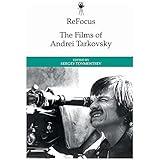ReFocus : The Films of Andrei Tarkovsky / Sergei Toymentsev.
Material type: TextSeries: ReFocus: The International Directors Series : RFIDSPublisher: Edinburgh : Edinburgh University Press, [2022]Copyright date: ©2021Description: 1 online resource (296 p.) : 24 B/W illustrationsContent type:
TextSeries: ReFocus: The International Directors Series : RFIDSPublisher: Edinburgh : Edinburgh University Press, [2022]Copyright date: ©2021Description: 1 online resource (296 p.) : 24 B/W illustrationsContent type: - 9781474437233
- 9781474437257
- 791.430233092
- PN1998.3.T36 F55 2021eb
- online - DeGruyter
| Item type | Current library | Call number | URL | Status | Notes | Barcode | |
|---|---|---|---|---|---|---|---|
 eBook
eBook
|
Biblioteca "Angelicum" Pont. Univ. S.Tommaso d'Aquino Nuvola online | online - DeGruyter (Browse shelf(Opens below)) | Online access | Not for loan (Accesso limitato) | Accesso per gli utenti autorizzati / Access for authorized users | (dgr)9781474437257 |
Frontmatter -- Contents -- Figures -- Notes on Contributors -- Introduction: Refocus on Tarkovsky -- Part I. Backgrounds -- Introduction to Part I -- 1. Tarkovsky’s Childhood: Between Trauma and Myth -- 2. Trava-Travlya-Trata: Tarkovsky’s Psychobiography à la Lettre -- 3. Does Tarkovsky Have a Film Theory? -- Part II. Film Method -- Introduction to Part II -- 4. The Child’s Eye View of War in Ivan’s Childhood -- 5. The Truth of Direct Observation: Andrei Rublev and the Documentary Style of Soviet Cinema in the 1960s -- 6. Temporality and the Long Take in Stalker -- 7. Framing Infinity in Tarkovsky’s Nostalghia -- 8. Approaching the Irreal: Realistic Sound Design in Andrei Tarkovsky’s Films -- Part III. Theoretical Approaches -- Introduction to Part III -- 9. Andrei Tarkovsky, Or the Thing from Inner Space -- 10. Wounds of the Past: Andrei Tarkovsky and the Melancholic Imagination -- 1 1. The Flesh of Time: Solaris and the Chiasmic Image -- 12. Cinema as Spiritual Exercise: Tarkovsky and Hadot -- 13. Memory and Trace -- Part IV. Legacy -- Introduction to Part IV -- 14. Zvyagintsev and Tarkovsky: Influence, Depersonalization, and Autonomy -- 15. Von Trier and Tarkovsky: From Antithesis to Counter-sublime -- Index
restricted access online access with authorization star
http://purl.org/coar/access_right/c_16ec
Reassesses the work of the influential Russian filmmaker Andrei TarkovskySheds new light on Tarkovsky’s biography in connection to his filmsAssesses the director’s contributions to film theory and aesthetics by close analysis of his films and writingsOffers highly original interpretations of Tarkovsky’s oeuvre in the context of film aesthetics, psychoanalysis, philosophy, cultural studies and art historyTraces the influence of Tarkovsky’s legacy on contemporary filmmakersDespite an output of only 7 feature films in 20 years, Andrei Tarkovsky has had a profound influence on international cinema. Famous for their spiritual depth and incredible visual beauty, his films have gained cult status among cineastes and are often included in ranking polls and charts dedicated to the ‘best movies ever made.’ Beginning with the late 1980s, Tarkovsky’s highly complex cinema has continuously attracted scholarly attention by generating countless hermeneutic challenges and possibilities for film critics.This book provides a fresh look at the director’s legacy, with critical essays by both world-famous and early-career film scholars. It examines Tarkovsky’s cinematic techniques and his treatment of genre, landscape and sound and offers highly original interpretations of his oeuvre in the context of film aesthetics, psychoanalysis, philosophy, cultural studies and art history.
Mode of access: Internet via World Wide Web.
In English.
Description based on online resource; title from PDF title page (publisher's Web site, viewed 01. Dez 2022)


